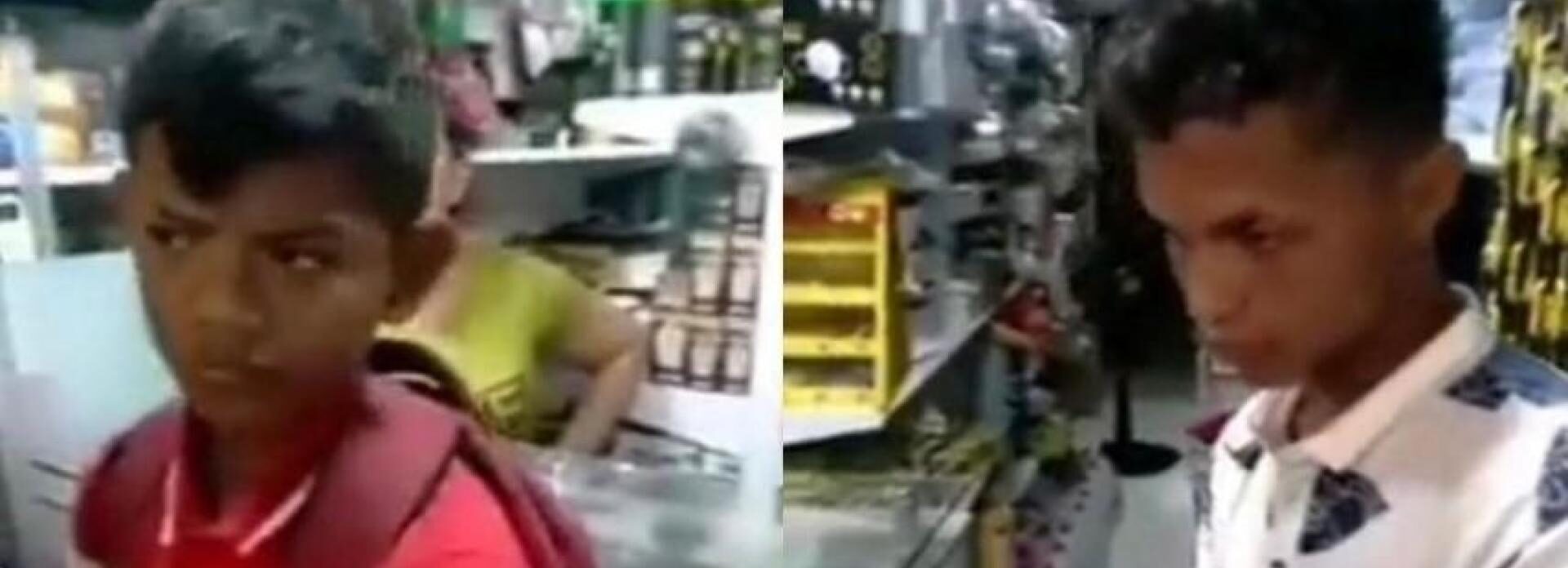International
Colombia probes murder of two young Venezuelan migrants

AFP
Colombian authorities are investigating the murder of two young Venezuelan migrants in the northeast of the country, sources said on Monday.
Authorities said the two youngsters, one of whom was allegedly only 12 years old, were murdered by an “illegal armed group”.
Videos and photos shared on social media appeared to show them on Saturday trying to steal clothing from a shop in Tibu, on the border with Venezuela — an area rife with criminal gangs.
“They were taken away… by an illegal armed group that took them to an unknown destination where they were murdered,” Jaime Marthey, the ombudsman in the Norte de Santander department, told Blu Radio.
Images seemingly from after they were caught, show the youngsters with their wrists bound with tape, surrounded by people giving them a warning: “We don’t want to see you lying by the side of a road tomorrow. We’re handing you over to authorities.”
The younger of the two was pictured carrying a red school backpack.
Other images show their bodies covered in blood by the side of a rural path after they were apparently shot in the stomach.
A piece of cardboard with the words “thieves” had been placed on the younger Venezuelan.
Tibu is the site of Colombia’s largest plantation of coca leaves, the main ingredient used in the fabrication of cocaine.
Various armed groups in the country are battling for control of the lucrative drug trafficking market.
Shopkeepers claim they called the police but no one came to take custody of the two youngsters.
Police colonel Carlos Martinez promised there would be an “internal investigation” and claimed the youngsters were killed by dissidents from the left-wing rebel Revolutionary Armed Forces of Colombia (FARC).
Martinez claimed the shopkeepers had beaten the Venezuelans, something the local shopkeepers’ federation denied, saying they tried to protect the youngsters and stop them from being taken away by unidentified men.
Venezuela’s attorney general Tarek Saab sent a letter to his Colombian counterpart, Francisco Barbosa, to request “clarification” of the situation and “any responsibilities that may arise.”
Earlier, Saab said on Twitter that “the full identification of the bodies has not been achieved and they have not been claimed by any family members.”
Colombia’s representation to the UN Commission on Human Rights posted a statement on Twitter denouncing the “murder of a 12-year-old child,” and calling on authorities to investigate.
International
New York Announces First 2,000 Seats in Universal 2-K Program

The Governor of New York, Kathy Hochul, and New York City Mayor Zohran Mamdani took another step today in their universal early education agenda by announcing the communities that will have access to the first 2,000 seats in the new 2-K program this fall — an initiative backed by a $73 million investment.
The funding is part of the $1.2 billion package previously unveiled by Hochul to strengthen child care and early childhood education across the city, one of the key campaign promises of the now Social Democratic mayor.
At the time of the announcement, the governor also outlined additional funds to reinforce the existing 3-K early education infrastructure, a program launched under former Mayor Bill de Blasio (2014–2021).
When the 2-K initiative was introduced in January, Mayor Mamdani explained that its first phase would offer 2,000 seats, with the goal of eventually expanding into a universal program — a commitment supported by the governor.
State investment in child care and preschool services is expected to increase to $4.5 billion by fiscal year 2027.
Among the first communities set to benefit from the 2,000 seats are Upper Manhattan and Inwood — areas with large Dominican populations — as well as Fordham and Kingsbridge in the Bronx, a borough with a Latino majority.
In East Brooklyn, Canarsie, Brownsville, and Ocean Hill will also be included. Meanwhile, Ozone Park and the Rockaways are among the neighborhoods that will see the rollout of the 2-K program.
International
Warner Bros. Developing First ‘Game of Thrones’ Movie With ‘Andor’ Writer

Warner Bros. is developing the first feature film based on the hit saga Game of Thrones, with Beau Willimon — screenwriter of Andor — attached to direct, according to a report published Tuesday by Page Six.
The project, currently in early development, will focus on the conquest of King Aegon I Targaryen. A separate television adaptation centered on the same historical storyline within the franchise is also in early stages at HBO.
However, the outlet noted that it remains unclear whether the film will move forward following the recent acquisition of Warner Bros. Discovery by Paramount Skydance.
If the merger is finalized, the movie could potentially be shelved, although that scenario appears unlikely given that the Game of Thrones franchise remains one of HBO’s most valuable and beloved properties.
After six seasons adapting the work of George R. R. Martin, the platform expanded the universe with House of the Dragon, a prequel series set 200 years before the events of Game of Thrones that explores the history of House Targaryen.
International
Spain’s Prime Minister to Address Nation Amid Trump’s Trade Threats

The Prime Minister of Spain, Pedro Sánchez, will deliver an institutional address this Wednesday at the Moncloa Palace regarding the escalating situation in the Middle East and recent threats directed at Spain by U.S. President Donald Trump.
The Spanish government announced that Sánchez will make a statement at 9:00 a.m. local time to outline his position on the latest developments following the U.S. and Israeli attacks on Iran.
Sánchez is expected to reiterate Spain’s reasons for opposing the use of U.S. military bases on Spanish soil in the operation—an action he has already described as being outside international law—while also expressing criticism of the Iranian regime.
Government sources indicated that the address had been planned prior to Trump’s remarks criticizing Spain’s stance. However, following those comments, Sánchez is now also expected to respond directly to the U.S. president’s statements.
Trump has threatened to “cut all trade with Spain” and said he wants “nothing to do” with the country after Madrid refused to authorize the use of the Morón and Rota military bases in southern Spain for operations against Tehran.
The U.S. president also labeled Spain “a terrible NATO partner” and warned that “no one” would tell him he could not use the facilities.
In response, the Spanish government stated that Spain fulfills its commitments to NATO and European defense. It also warned Trump that any review of bilateral trade relations must respect international law and the agreements in place between the European Union and the United States.
-

 International2 days ago
International2 days agoIran Reports 201 Dead, 747 Injured After U.S. and Israeli Strikes
-

 International2 days ago
International2 days agoPope Leo XIV Urges End to ‘Spiral of Violence’ in Middle East
-

 International4 days ago
International4 days agoTrump Floats “Friendly Takeover” of Cuba Amid Rising Tensions
-

 Sin categoría3 days ago
Sin categoría3 days agoTrump: ‘We Think It’s True’ Amid Claims Iran’s Supreme Leader Was Killed
-

 International3 days ago
International3 days agoSecurity Council to Hold Emergency Meeting on Middle East Crisis
-

 International1 day ago
International1 day agoBrazil’s Supreme Court Rejects Bolsonaro’s Bid for House Arrest
-

 International4 days ago
International4 days agoArgentina’s Senate Reviews Milei-Backed Labor Overhaul
-

 International1 day ago
International1 day agoAnti-ICE Billboard Campaign Targets Immigration Spending in 31 U.S. Cities
-

 International1 day ago
International1 day agoTrump Warns of ‘Major Wave’ of Attacks as Iran Conflict Escalates
-

 International1 day ago
International1 day agoMexico Calls for Immediate Probe After National Dies in ICE Custody
-

 Central America1 day ago
Central America1 day agoPanama Canal Monitoring Trade as Middle East Conflict Disrupts Shipping
-

 International1 day ago
International1 day agoBolivia Orders Three Investigations Into Deadly Military Plane Crash
-

 International4 hours ago
International4 hours agoNew York Announces First 2,000 Seats in Universal 2-K Program
-

 International4 hours ago
International4 hours agoSpain’s Prime Minister to Address Nation Amid Trump’s Trade Threats
-

 Central America4 hours ago
Central America4 hours agoGuatemala’s Attorney General Fails in Bid for Top Court Seat Amid Corruption Allegations
-

 International4 hours ago
International4 hours agoWarner Bros. Developing First ‘Game of Thrones’ Movie With ‘Andor’ Writer




























